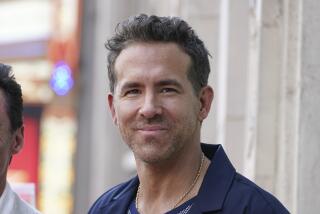There’s No Insurance Like Hollywood Insurance : Show business: A man who fantasized about an acting career as a boy has made his mark on the industry in another way.
- Share via
DES MOINES, Iowa — Frustrated actor Stan Reynolds has made it big in show business by insuring the Silver Screen instead of appearing on it.
From a base in Des Moines, his Reynolds & Reynolds Inc. agency is broker for policies covering nearly one out of every four movie screens in the country.
At times, Reynolds even gets to break out the makeup and costumes. He dresses up as Sherlock Holmes or Dracula, for instance, to spice up loss-prevention seminars for theater workers.
In addition to preaching common-sense precautions to keep theater patrons from slipping on spilled drinks, Reynolds also counsels clients about dealing with outbreaks of violence during controversial movies.
All the while, he has become a part of the Hollywood scene he fantasized about as a child in Minnesota. Reynolds rose to the helm of the entertainment industry’s charity--Variety Clubs International--and hobnobs with heads of state and box-office idols.
A wall on his office is plastered with photos of Reynolds with dignitaries, including former British Prime Minister Margaret Thatcher, and such stars as the late Cary Grant.
The 20-year courtship of the movie industry by a broker from America’s heartland is reminiscent of a script from a B movie: country bumpkin triumphs against the odds.
“Des Moines, Iowa? This is Hollywood, man. They’ll eat you alive out here,” a manager for a Hollywood theater chain warned Reynolds nearly 20 years ago.
That executive, Lyndell Mayberry, wound up awarding Reynolds the insurance business for what is now known as Mann’s Chinese Theatre and about 300 other screens in 1976. He also became a friend.
“He was a man you could depend on,” said Mayberry, now retired and living in Los Angeles home. “If he told you something, he stood by it.”
Reynolds also won the business of the 382 screens now operated by Cinamerica, a joint venture of Paramount Communications and Time Warner. Again, it was a tough sell.
“He got thrown out of the office I’m sitting in, initially by one of my predecessors,” said Lee Craner, executive director for finance and risk management for Cinamerica. “He was persistent.”
Now Craner sings Reynolds’ praises.
“He’s the one who asks the intelligent questions. He’s probably more knowledgeable than anyone else as far as the theater exhibition industry,” Craner said.
Reynolds views the Midwest ties as an asset.
“If you are from Des Moines, Iowa, they trust you immediately,” he said.
“I could run my theater business from anywhere in the country. I chose to live in Des Moines,” he said from his downtown office.
He sips coffee and sneaks an occasional puff from a cigarette, saying he intends to quit smoking, again. Because smoking is not allowed in public offices in Iowa, Reynolds has to close his office door to light up.
Each of the agency’s 31 employees has his or her own office.
“It may take up 20% more space, but I think you get 20% more work,” Reynolds said. The staff members all share in profits too, although Reynolds won’t release figures.
Hallways and offices are decorated with movie posters. One collector’s item promotes a coming attraction--”Revenge of the Jedi.” The “Star Wars” sequel had its name changed to “Return of the Jedi” before its release.
Movies have always been a part of Reynolds’ life.
As a child growing up in the Minnesota communities of St. Paul and White Bear Lake, he cashed in soft-drink bottles to pay the 12-cent admission to Saturday matinees. He’d watch a singing cowboy feature, a couple of cartoons and the latest installment of a serial, then go home and act out the plots with friends. Reynolds recalls flipping coins with his buddies “to see who was the good guy and who was the bad guy.”
He earned a bachelor’s degree in speech and theater at the University of Minnesota. But Reynolds began his business career as a lobbyist for Minnesota Mining & Manufacturing Co., touting 3M’s reflective coatings for license plates. His first assignment was Des Moines. He had been expecting a posting in Seattle.
“I called my boss and said, ‘You’ve got to be kidding.’ Now I choose to live here. I think it’s one of the greatest places to live in the world,” said Reynolds, 51, who travels more than 100,000 miles a year.
He went to work for an Iowa insurance agency rather than accept a subsequent transfer with 3M. His first big account was a contract covering the 80 screens operated by Central States Theater Corp. of Des Moines.
“It kind of changed my life,” he said.
He discovered there was no national insurance program for theaters, so came up with a program dubbed TOPIC, for Theatre Owners Package Insurance Coverage. He set up his own company in 1976 and went door-to-door drumming up business.
“I think he understands theaters. It’s not a particularly desirable risk individually. But collectively, that’s the strength,” said Bonnie Alt, a vice president at Pacific Theaters of Los Angeles, which has about 80 theaters in California, Hawaii and New York.
In 1988, Reynolds acquired the only other leading agency specializing in movie coverage, Theatre Consultants in Kansas City, Mo.
His coverage is endorsed by the National Assn. of Theatre Owners, which represents the owners of about 14,000 screens.
And every so often, he gets to scratch his acting itch.
Dressing up as Dracula, he conducts loss-prevention seminars with themes such as “You Can Turn Your Theater Into a Horror Show Each Night.”
As Sherlock Holmes, Reynolds offered a demonstration of what can happen with a fire in a popcorn machine if improper care is given to fire extinguishers.
The stage was lighted with two candles as he made his entrance carrying two balloons, one of them barely inflated. An audience member, in a rehearsed move, asked about the props.
Reynolds released air from the full balloon. One candle blew out. “We’ve now got an $80 cleanup operation on the popcorn machine,” he told his audience.
The second, barely inflated balloon failed to put out the other candle. “Now we don’t have an $80 cleanup job,” he told the audience. “We’ve got a $60,000 fire that spreads throughout the whole concession area--or a $100,000 fire.”
More to Read
The biggest entertainment stories
Get our big stories about Hollywood, film, television, music, arts, culture and more right in your inbox as soon as they publish.
You may occasionally receive promotional content from the Los Angeles Times.










